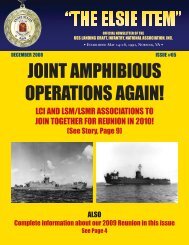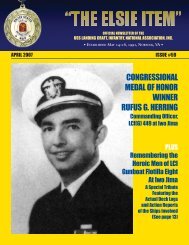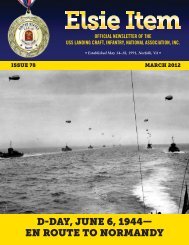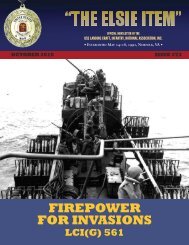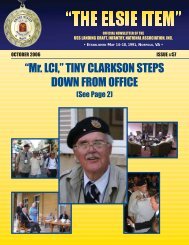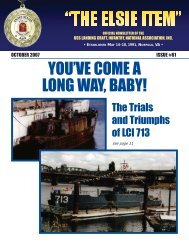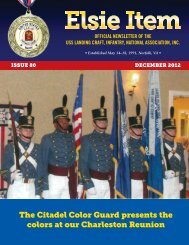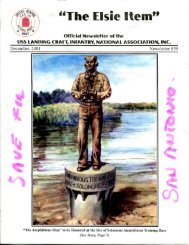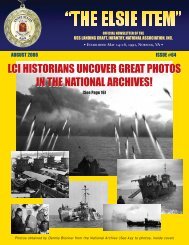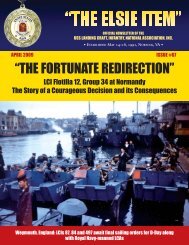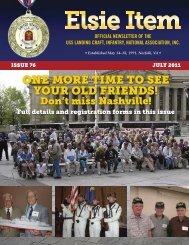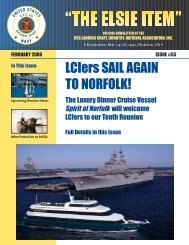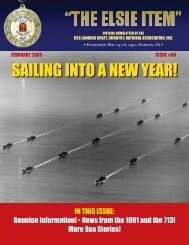âOh GOd, yOur sea is sO larGe and my ship is sO smallâ
âOh GOd, yOur sea is sO larGe and my ship is sO smallâ
âOh GOd, yOur sea is sO larGe and my ship is sO smallâ
Create successful ePaper yourself
Turn your PDF publications into a flip-book with our unique Google optimized e-Paper software.
quoted Tennyson in pencil:My mariners,Souls that have toil'd, <strong>and</strong> wrought, <strong>and</strong> thought with me—That ever with a frolic welcome tookThe thunder <strong>and</strong> the sunshine, <strong>and</strong> opposedFree hearts, free foreheadsFifteen years after Okinawa, when he was suffering tragicreverses—personal, financial, corporate—our phone rang.It was a 1091 sailor, now a successful funeral director, <strong>and</strong>he’d called to thank <strong>my</strong> father for inspiring h<strong>is</strong> r<strong>is</strong>e in life. Iremember Dad walking back into the living room shaking h<strong>is</strong>head with a gratitude that verged on tears.He died in 1982, already senile at the age of 71, <strong>and</strong> Iinherited all h<strong>is</strong> pictures of 1091 <strong>and</strong> its crew, a briefcase full oforders <strong>and</strong> the navigation charts of Okinawa he’d inscribed witha pencil <strong>and</strong> a straightedge.One night in 2001, I was in the shower, where I do some of <strong>my</strong>best thinking. I realized that if <strong>my</strong> father’s LCI was numbered1091, there must have been a lot of them <strong>and</strong> a lot of sailorswho sailed on them.I dried off, booted up <strong>my</strong> computer <strong>and</strong> punched “l<strong>and</strong>ing craftinfantry” into a <strong>sea</strong>rch engine. Amazing! There was a big LCIorganization—veterans who held conventions <strong>and</strong> celebratedtheir service in what they called the “Gator Navy” or “WaterbugNavy.” They had hats, badges, postcards, pins, medallions,calendars <strong>and</strong> a sticker for kids reading, MY GRANDMA MARRIEDAN LCI SAILOR.How I w<strong>is</strong>hed <strong>my</strong> father were alive to know it. The next night,on a wild off chance, I tried punching in “LCI-1091.”What I saw brought me out of <strong>my</strong> chair, shouting to <strong>my</strong> wife: “Ifound <strong>my</strong> father’s <strong>ship</strong>! I found the 1091!”Of all the LCIs built in all the world, the only one left intact—or so it was believed then—was <strong>my</strong> father’s, <strong>and</strong> it was mooredin Eureka, Calif. Its owner was a dent<strong>is</strong>t named Ralph Dav<strong>is</strong>,who was restoring it to World War II condition. Somehow, despiteany failures, <strong>my</strong> father was redeemed, <strong>and</strong> I, in <strong>my</strong> boyhooddreams, was justified. The past <strong>is</strong> never dead. It <strong>is</strong>n’t even past.I learned more of h<strong>is</strong> <strong>ship</strong>’s h<strong>is</strong>tory. After a stint at the BikiniAtoll atomic bomb tests <strong>and</strong> l<strong>and</strong>ings in the north during theKorean War on spy m<strong>is</strong>sions to <strong>sea</strong>rch for the presence ofbubonic plague (they found smallpox), 1091 returned statesideto Astoria, Ore., <strong>and</strong> was sold to a f<strong>is</strong>hing company that used itfor 20 years on the Yukon River.Dav<strong>is</strong> bought it in 1989. He had always wanted to be captainof a <strong>ship</strong>. He’d hoped to join the Navy but had been drafted intothe Ar<strong>my</strong>, which trained him as a dental ass<strong>is</strong>tant. He had apractice in McKinleyville, Calif., up in redwood <strong>and</strong> marijuanacountry. He’d never owned any boat larger than an aluminumrunabout with a little outboard motor. But Dav<strong>is</strong> not only bought1091, he sailed it down from the Pacific Northwest <strong>and</strong> moored itin Humboldt Bay. Once a year, with h<strong>is</strong> wife, First Mate BobbieJo, he took it out albacore f<strong>is</strong>hing.I called Dav<strong>is</strong>. He knew nothing of the <strong>ship</strong>’s early h<strong>is</strong>tory. Wearranged for me <strong>and</strong> <strong>my</strong> oldest son, Peter, to fly out there inAugust from Washington, D.C.“We’ll show you a good time,” Captain Ralph said. The greattreat was to be breakfast in Eureka’s Samoa Cookhouse, a hugemess hall that once fed lumberjacks.Before our trip, I made more calls, sent more messages. Ifound a crewman: quartermaster <strong>and</strong> signalman Loyel “Bud”Hoseck. He’d spent the Battle of Okinawa st<strong>and</strong>ing on theconning tower beside <strong>my</strong> father, working signals. Now he wasretired in Minnesota. He told me stories <strong>my</strong> father had not.“The first night we got to Okinawa, four kamikazes came in atsunset, coming so close you could almost touch them,” he said.“The battle<strong>ship</strong> M<strong>is</strong>souri was a block away. A kamikaze hit it;there were 41 killed.”Hoseck had kept a diary <strong>and</strong> written a brief memoir. He sentthem to me. They told of torpedo boats, suicide barges <strong>and</strong> 1091gunners shooting up floating boxes <strong>and</strong> crates on the chancethey might be bombs propelled by suicide swimmers; how the<strong>ship</strong> was on the beach at Ie Shima , delivering a tank, whenErnie Pyle, the famous <strong>and</strong> beloved war correspondent, waskilled a hundred yards away; how they threw away bad mutton<strong>and</strong> chicken from Australia <strong>and</strong> lived on little else but macaroni<strong>and</strong> cheese, a diet so tedious that K-rations were a treat. Theyhad a phonograph but only one record: “Don’t Fence Me In.”“At night when the big <strong>ship</strong>s were shelling the <strong>is</strong>l<strong>and</strong> <strong>and</strong>shooting over us, we would have to strap ourselves in our bunks,or the concussion would flip you right out of your bunk,” Budsaid. “One strap was across our chest <strong>and</strong> another across ourhips. Sleep was hard to get.”And there was a story <strong>my</strong> father never told me, perhapsbecause of the ending. Bud remembered a kamikaze “that washit hard <strong>and</strong> the pilot couldn’t steer h<strong>is</strong> plane into a <strong>ship</strong>. It hitthe water a couple hundred feet from our <strong>ship</strong>. After the bigsplash, we couldn’t believe it when the pilot surfaced.…We puta rope ladder for him to climb; we thought we might as well takehim pr<strong>is</strong>oner.…As the Jap reached the edge of the <strong>ship</strong>’s deck,we offered him a h<strong>and</strong> to help him aboard. That’s when hepulled a knife <strong>and</strong> was going to get one more American. The guyswith guns were alert, <strong>and</strong> a couple of blasts sent him tumblinginto the ocean. One wanted to go down the ladder <strong>and</strong> get h<strong>is</strong>helmet; they had nice leather headgear.…We didn’t let him godown. But as a comment <strong>and</strong> don’t want to dwell on, somemilitary personnel used to recover the gold teeth of dead Japs.”May 12, 1945: LCI blown up by suicide plane, two survivors.Planes strafed <strong>and</strong> killed engineering officer <strong>and</strong> two men onLSM-414. Had been moored alongside them the day before.Suicide plane crashed into New Mexico, killed about 150 men. I12 | ELSIE ITEM | October 2011




